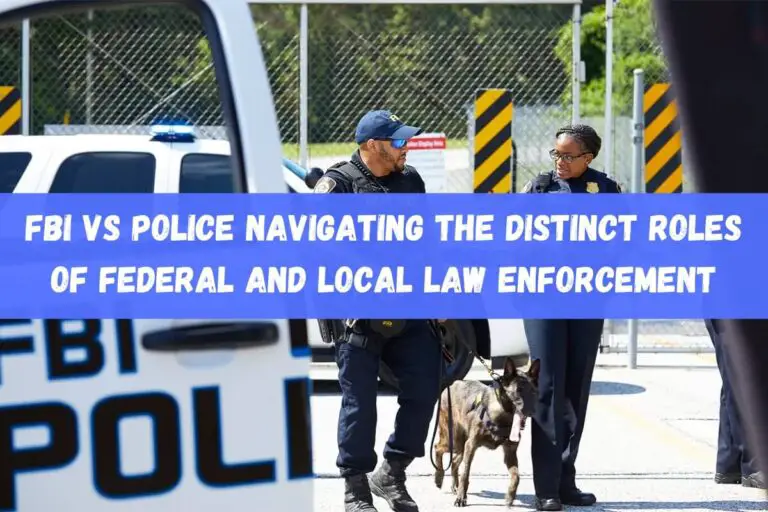Sheriff vs Police: Key Differences, Roles and Responsibilities

Law enforcement is a vital component of any well-functioning society, responsible for maintaining order, upholding the law, and ensuring public safety. While the terms “sheriff” and “police” are often used interchangeably, they represent distinct roles within the criminal justice system, each with its own set of responsibilities, jurisdictions, and operational structures.
So, what is the key difference between a sheriff and a police officer?
The primary distinction lies in their jurisdictional boundaries and the method of selection. Sheriffs are county-level law enforcement officials elected by residents, while police officers are typically appointed by local governments to serve within municipal boundaries.
This guide examines the differences between police officers and detectives. It looks at their historical roots, job duties, training needs, career paths, and what makes these roles unique. If you want a law enforcement career or just understand the justice system better, this article provides useful information.
What is a Sheriff? Origins and Role in Modern Law Enforcement
The office of the sheriff has a rich history dating back to ancient England, where “shire-reeves” were appointed to maintain law and order in the shires (counties). This tradition was carried over to the American colonies, and today, sheriffs remain an integral part of the law enforcement landscape across the United States.
A sheriff is the chief law enforcement officer of a county, elected by the residents of that county to serve a specific term, typically ranging from two to six years, depending on the state. Sheriffs oversee the operations of the county sheriff’s office, which is responsible for enforcing laws within the county’s jurisdiction, including unincorporated areas and municipalities without their police force.
Duties and Responsibilities of Sheriffs
The duties and responsibilities of sheriffs are multifaceted, extending beyond traditional law enforcement activities. Some of the key responsibilities of sheriffs include:
- Law Enforcement within County Jurisdiction: Sheriffs and their deputies patrol and respond to calls within unincorporated areas of the county, as well as municipalities that have contracted with the sheriff’s office for law enforcement services. They investigate crimes, make arrests, and maintain public order throughout their jurisdiction.
- Court-Related Duties: Sheriffs play a crucial role in the judicial system, including providing security at courthouses, serving warrants and legal documents, transporting prisoners to and from court proceedings, and executing court orders.
- Jail and Corrections Management: In many counties, sheriffs are responsible for overseeing and managing the county jail system, ensuring the safe and secure detention of inmates awaiting trial or serving shorter sentences.
- Civil Process Service: Sheriffs and their deputies are often tasked with serving civil processes, such as property seizures, foreclosure auctions, and other court-ordered actions related to civil matters.
- Specialized Units: Depending on the size and resources of the sheriff’s office, they may operate specialized units such as SWAT teams, K-9 units, aviation units, marine patrols, or mounted units to address specific law enforcement needs within their jurisdiction.
- Community Policing and Outreach: Many sheriff’s offices prioritize community policing initiatives, fostering strong relationships with the communities they serve through outreach programs, neighborhood watch groups, and public education efforts.
How Sheriffs are Selected and Their Terms of Office
One of the key distinguishing factors of sheriffs is their method of selection. In most states, sheriffs are elected officials, chosen by the residents of the county they serve through a direct electoral process. This election process introduces an additional layer of accountability, as sheriffs must answer directly to the public they serve.
The term of office for sheriffs varies across states, with some serving two-year terms (e.g., New Hampshire), others serving four-year terms (the most common), and a few states, such as Massachusetts, having six-year terms for their sheriffs.
In some states like Rhode Island and Hawaii, and certain counties, sheriffs are appointed, not elected.
The election of sheriffs has both advantages and criticisms. Proponents argue that it ensures direct accountability to the public and allows residents to have a voice in selecting their chief law enforcement officer. Critics, however, suggest that the election process can introduce political influences and potential conflicts of interest, potentially compromising the impartial administration of justice.
What is a Police Officer? Role in Urban Law Enforcement
Police officers, on the other hand, are the primary law enforcement officials within cities and municipalities. They are typically employed by local governments and operate under the authority of a police department, led by a chief of police.
The primary role of police officers is to maintain law and order within the boundaries of their respective city or municipality. They are responsible for patrolling assigned areas, responding to calls for service, investigating crimes, enforcing traffic laws, and ensuring the overall safety and security of the community they serve.
Police departments are structured hierarchically, with officers reporting to supervisors, sergeants, lieutenants, and ultimately, the chief of police. Some police departments also employ detectives, who specialize in investigating specific types of crimes, such as homicides, narcotics offenses, or financial crimes.
Police officers often work with other agencies, like county sheriff’s offices, state police, or federal agencies, on cases that involve multiple jurisdictions or investigations.
Duties and Responsibilities of Police Officers
The duties and responsibilities of police officers are diverse and can vary depending on their specific assignment or unit. However, some of the core responsibilities include:
- Patrolling and Responding to Calls: Police officers are tasked with patrolling their assigned areas, responding to calls for service from the public, and addressing any incidents or emergencies that arise within their jurisdiction.
- Crime Prevention and Investigation: Officers play a crucial role in preventing and investigating crimes, gathering evidence, interviewing witnesses, and apprehending suspects.
- Traffic Enforcement and Accident Response: Police officers are responsible for enforcing traffic laws, issuing citations for violations, and responding to and investigating traffic accidents.
- Community Policing and Outreach: Many police departments emphasize community policing initiatives, which involve building positive relationships with the communities they serve through outreach programs, neighborhood meetings, and proactive engagement.
- Specialized Units: Larger police departments often have specialized units to address specific areas of law enforcement, such as SWAT teams, K-9 units, narcotics divisions, homicide units, or air support units.
- Testifying in Court Proceedings: Police officers are frequently called upon to testify in court proceedings, providing eyewitness accounts, presenting evidence, and assisting in the prosecution of criminal cases.
Appointment and Oversight of Police Officers
Unlike sheriffs, who are elected, police officers are typically appointed by local government authorities, such as the mayor or city council. The appointment process often involves rigorous testing, background checks, and interviews to ensure the suitability of candidates for the position.
Police departments are subject to various oversight and accountability measures, such as civilian review boards, internal affairs divisions, and external oversight from government entities or independent auditors. These measures aim to promote transparency, address complaints or allegations of misconduct, and ensure that police officers are adhering to established policies and procedures.
Police officers in many areas are part of labor unions that negotiate with local governments for their members’ wages, benefits, and working conditions.
Key Differences Between Sheriffs and Police Officers
While both sheriffs and police officers serve as law enforcement officials, several key differences distinguish their roles and operational structures:
- Jurisdictional Boundaries: Sheriffs have jurisdiction over an entire county, including unincorporated areas and municipalities without their police force. Police officers, on the other hand, have jurisdiction limited to the boundaries of the city or municipality they serve.
- Method of Selection: Sheriffs are typically elected officials, chosen by the residents of the county they serve through a direct electoral process. Police officers, in contrast, are appointed by local government authorities, such as the mayor or city council.
- Oversight and Accountability: Sheriffs, as elected officials, are directly accountable to the public they serve and can be re-elected or replaced through the electoral process. Police officers are subject to oversight and accountability measures imposed by local governments, civilian review boards, and internal affairs divisions.
- Scope of Responsibilities: In addition to traditional law enforcement duties, sheriffs often have additional responsibilities related to court operations, jail management, civil process service, and specialized units covering a broader geographical area. Police officers typically focus on law enforcement within city limits.
- Leadership Structures: Sheriffs are the highest-ranking law enforcement officials in their respective counties, while police departments are led by a chief of police, who reports to local government authorities.
- Potential for Political Influence: As elected officials, sheriffs may be subject to political influences and pressures, which could potentially impact their decision-making and policies. Critics argue that this could compromise the impartial administration of justice, while proponents contend that direct accountability to the public is a strength of the elected sheriff system.
Sheriffs and police officers have different roles, but they often work together, especially on cases that involve multiple areas.
Addressing Common Misconceptions
Despite the clear differences between sheriffs and police officers, several common misconceptions persist:
- Myth: Sheriffs have more authority than police officers. This is not entirely accurate. While sheriffs have jurisdiction over an entire county, their authority and powers are generally comparable to those of police officers within their respective jurisdictions.
- Myth: Sheriffs can enforce the law anywhere. Sheriffs and their deputies are typically limited to enforcing laws within their county’s boundaries unless specific agreements or circumstances allow for cross-jurisdictional cooperation.
- Myth: Police officers cannot operate outside city limits. While police officers’ primary jurisdiction is within their city or municipality, they often have the authority to pursue suspects, respond to emergencies, or assist other agencies in certain situations that extend beyond their jurisdiction.
Understanding these misconceptions is crucial to avoid confusion and ensure proper cooperation and coordination between different law enforcement agencies.
Training and Educational Requirements
Both sheriffs and police officers must undergo extensive training and education to prepare them for the demanding roles they play in law enforcement. While specific requirements may vary by state and agency, there are some common elements:
- Basic Training Academies: All prospective deputies and police officers must complete a comprehensive basic training academy, which typically lasts between 12 to 14 weeks. These academies provide instruction in areas such as criminal law, defensive tactics, firearms proficiency, emergency vehicle operations, and report writing.
- Continuing Education and Specialized Training: Law enforcement professionals are required to participate in ongoing training and education programs to stay up-to-date with changes in laws, procedures, and best practices. Many agencies also offer specialized training in areas such as investigations, crisis intervention, community relations, and leadership.
- Educational Qualifications: While specific educational requirements vary, most law enforcement agencies prefer candidates with at least an associate’s degree or, increasingly, a bachelor’s degree in fields such as criminal justice, law enforcement, or a related discipline.
- Essential Skills: Successful sheriffs and police officers must possess strong communication, problem-solving, and critical thinking skills, as well as the ability to remain composed under pressure and make sound decisions in high-stress situations.
Investing in proper training and education is crucial for ensuring that law enforcement professionals are equipped to handle the diverse challenges they may face in their careers.
Career Paths and Advancement Opportunities
Both sheriff’s departments and police forces offer various career paths and advancement opportunities for dedicated and high-performing individuals:
- Promotional Tracks: Within sheriff’s departments and police forces, officers and deputies can advance through the ranks by meeting specific criteria, such as years of service, educational qualifications, and performance evaluations. Typical promotional paths may include positions like sergeant, lieutenant, captain, and eventually, chief deputy or deputy chief.
- Lateral Transfers: In some cases, officers or deputies may have the opportunity to transfer laterally between different agencies, either within the same jurisdiction or to a different city or county.
- Specializations and Leadership Roles: Many law enforcement agencies offer opportunities for specialization in areas such as investigations, SWAT teams, K-9 units, or training divisions. Additionally, leadership roles in areas like community policing, public information, or administrative roles may be available.
- Retirement and Pension Benefits: Law enforcement professionals typically have access to attractive retirement and pension benefits after serving for a specified number of years, with the exact terms varying by agency and jurisdiction.
Successful career advancement in law enforcement often requires a combination of dedication, ongoing education and training, strong performance, and effective leadership skills.
Frequently Asked Questions
Can sheriffs and police officers operate outside their designated jurisdictions?
While their primary jurisdictions are limited, both sheriffs and police officers can operate outside their designated areas in certain circumstances, such as:
- In pursuit of a suspect who has fled their jurisdiction
- Responding to emergencies or requests for assistance from other agencies
- Participating in joint operations or task forces with other law enforcement agencies
However, they typically must follow established protocols and maintain communication and coordination with the agencies responsible for the area in which they are operating.
What is a state trooper, and how do they differ from sheriffs and police?
State troopers are law enforcement officers employed by state-level agencies, such as state police or highway patrol. Their primary responsibilities involve enforcing traffic laws on state highways and interstates, as well as providing specialized support and assistance to local law enforcement agencies. State troopers typically have statewide jurisdiction, but their roles and responsibilities differ from those of county sheriffs or municipal police officers.
Do sheriffs and police have the same arrest powers?
Generally, sheriffs and police officers have similar arrest powers within their respective jurisdictions. They can make arrests based on probable cause, execute arrest warrants, and use reasonable force when necessary to apprehend suspects. However, the specific procedures and protocols for arrests may vary slightly between agencies and jurisdictions.
How do the salaries of sheriffs and police officers compare?
Salaries for sheriffs and police officers can vary significantly depending on factors such as the location, agency size, cost of living, and the individual’s rank or position. In general, salaries for entry-level deputies and police officers may be relatively similar, but as they advance through the ranks, salaries can diverge based on the specific agency and jurisdiction.
Can civilians file complaints against sheriffs or police officers?
Yes, most law enforcement agencies have established procedures for civilians to file complaints regarding the conduct or actions of sheriffs, deputies, or police officers. These complaints are typically investigated by internal affairs divisions or civilian review boards to ensure accountability and address any potential misconduct or policy violations.
Conclusion
In the complex landscape of law enforcement, sheriffs and police officers play vital yet distinct roles in maintaining public safety and upholding the rule of law. While their core missions may be similar, the differences in their jurisdictions, methods of selection, oversight structures, and responsibilities set them apart.
Understanding these nuances is essential not only for those considering careers in law enforcement but also for the general public to foster a better appreciation for the intricacies of the criminal justice system. By recognizing the unique strengths and challenges of each role, we can work towards promoting accountability, cooperation, and effective collaboration among all law enforcement agencies.
The dedication, professionalism, and commitment to serving and protecting the community are the hallmarks of sheriffs and police officers.






